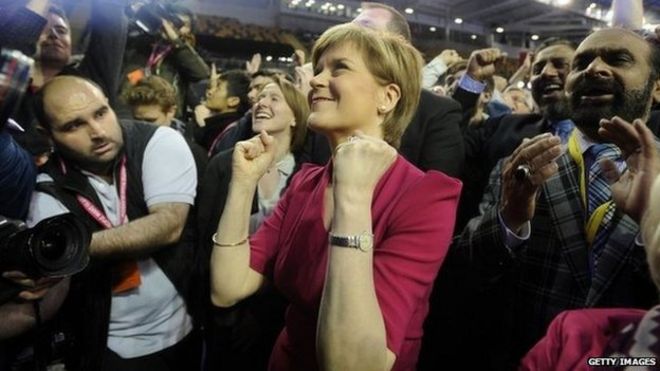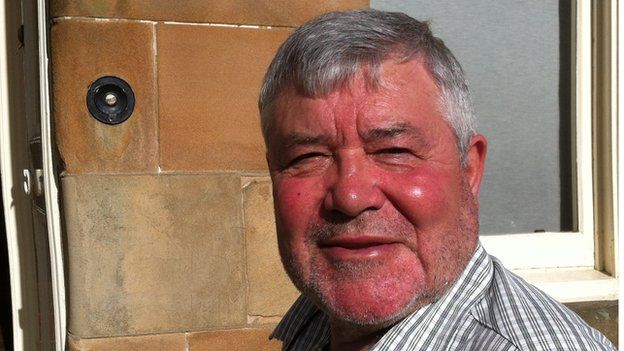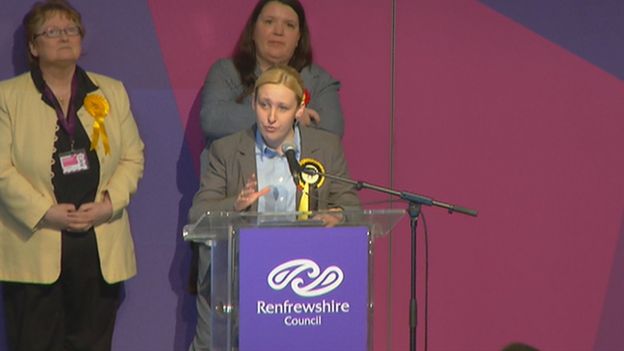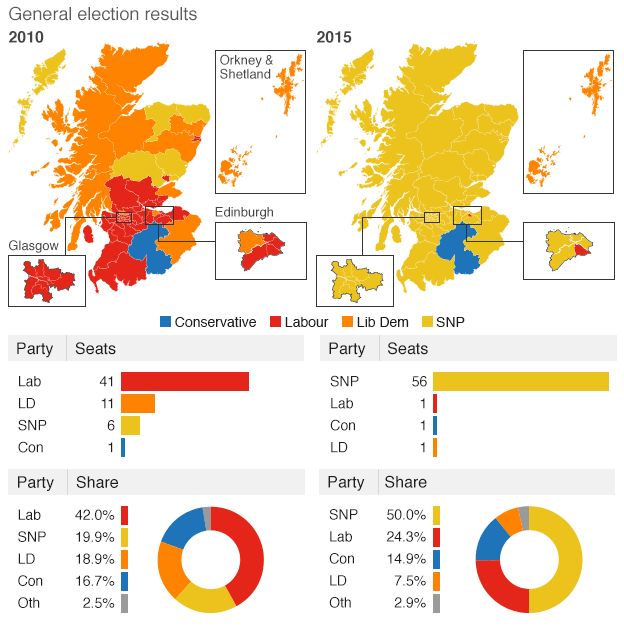Scotland's SNP election success changes political landscape

The political contours of Scotland have been redrawn by the Scottish National Party's landslide victory.
The SNP took 56 of Scotland's 59 available seats at Westminster, swamping Labour's historic strongholds. The former Labour Prime Minister Gordon Brown's old seat switched to the SNP with an astonishing 35% swing to the nationalists - this in an electoral system where a 10% swing is considered large.
In Glasgow, where all seven Labour seats were won by the SNP, one - Glasgow North East - notched up a massive swing from Labour to the SNP of 39.3%.
Some of the big beasts in the Scottish Labour jungle were swept from parliament including Jim Murphy, the Scottish Labour leader himself, and Douglas Alexander, the shadow foreign secretary.
The SNP leader and Scotland's First Minister, Nicola Sturgeon, said she wanted Scotland's voice to be heard and that it would be hard to ignore.
Alex Salmond, the man she replaced as party leader after last year's independence referendum, put it more rhetorically: "The Scottish Lion has roared," he said.
But what will that roar mean in the months ahead?
How Scotland's political map has changed
David Cameron said he would govern for "one nation".
But Bob Thomson, a former Scottish Labour Party treasurer who came out for independence last year, said Mr Cameron showed "breathtaking hypocrisy" after suggesting during the election campaign that SNP influence on a Westminster government would be almost "unconstitutional".
He said Mr Cameron had put a "big nail in the coffin" of the union with his campaign, which he said was aimed at frightening English voters about SNP influence.

Scotland's centre of gravity has shifted to the left politically, just as England's has moved definitely to the right.
That gap will be harder to bridge without a left-of-centre party with large numbers of Scottish MPs committed to the union, as Labour was.

UK Prime Minister David Cameron wants to cut the deficit sharply, and the SNP will claim London has no mandate to do so in Scotland.
Bob Thomson said that, unless there was dramatic constitutional change, the union would last no more than five years.
Media caption Nicola Sturgeon: "The tectonic plates of Scottish politics shifted yesterday"
He said if Mr Cameron tried to block another independence referendum there could be "widespread civic unrest".
Though Nicola Sturgeon did not campaign for independence during the election, she did argue strongly against the renewal of Trident - a submarine-based nuclear deterrent the SNP calls Britain's "weapons of mass destruction".
"[The SNP] didn't run on independence so they can't say this is a vote for another independence referendum," said Dr Phillip O'Brien, director of the Scottish centre of war studies at Glasgow University and a reader in political history.
"But they did run on getting Trident out of the UK, and so the SNP can say there is a clear division between Scotland and the rest of the UK."
He says the SNP will exploit that division.
More important, he says, is the referendum on EU membership that David Cameron has promised.
If the UK votes to leave the EU but Scotland votes to stay, the SNP would see it as "clear grounds for another independence referendum" and the Scottish people would certainly support another vote, he says.
"The SNP has sealed its position as Scotland's dominant party," says Magnus Gardham, political editor of the Herald newspaper in Scotland.
He says the SNP leadership will not want another vote on independence before the polls show they can definitely win.
"What they can't afford to do is lose a second referendum in quick succession," he says.
Scotland is setting a different course from the rest of the United Kingdom.
The union which bound them to England and saw them jointly build a global empire is more fragile than ever.
Expectations are running high in Scotland and could easily be dashed, but the UK parliament will now hold 56 restless MPs whose loyalties are not really to the parliament in which they sit.
The constitutional crisis the vote could engender has only just begun.


Comments